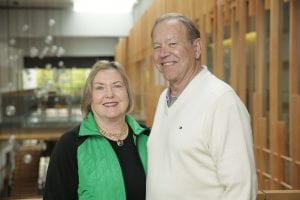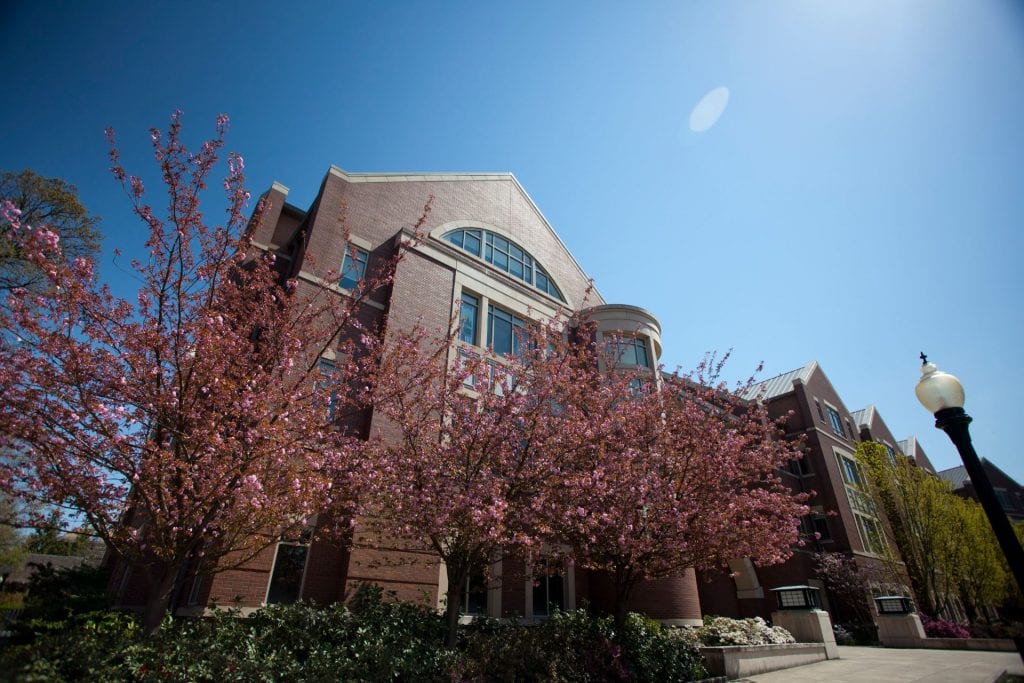
Cate Gelband JD ’20 discovered the law while taking an undergraduate introductory legal class at Western Washington University. With a passion for writing and creative problem solving, Gelband desired a career where she could help clients work toward their goals and achieve results. Inspired by the intellectual challenges of law, Gelband decided to pursue a career in the law.
When looking for law schools, Gelband knew she wanted to find a legal community in the Pacific Northwest that she could continue to be a part of long after graduation. Now, in her third year in law school, the Washington native says that Oregon Law was the right choice for her.
As a first-year law student, she knew right away that she wanted to study business law. She was eager to work on exciting, challenging projects that require analytical and technical skill, a broad knowledge base, and sharp focus. She wanted to work collaboratively and learn from those around her to help clients achieve their goals – and she’s done all of that during her nearly three years at Oregon Law.
“I knew law school would be challenging and competitive,” says Gelband. “And it has been challenging, but in all the right ways.”
Some of the most difficult parts of law school have been finding a balance between studying, work outside of the classroom, life outside of law school – and her courses.
Gelband says that taking foundational courses such as Business Associations, Secured Transactions, Federal Income Tax, Tax Policy, and Mergers and Acquisitions, as well as a research- and discussion-based course on Securities Regulation, have helped her confirm her business law career path.
“All of those classes had an “ah-ha” moment for me because at some point in each one we’d discuss a concept, even something minor, that I’d been waiting to learn about since I got to law school,” said Gelband. “The excitement and curiosity I felt every time that happened confirmed for me that I was making the right choice.”
Gelband also points to her experience in the Business Law Clinic as pivotal during her time at Oregon Law. The Clinic provides students like Gelband with the opportunity to represent business clients in a simulated law firm environment under the direct supervision of the Clinics’s attorneys. Clinic students are responsible for all aspects of client representation – from the initial meeting to the final meeting where the students present the documents that they have drafted and explain the legal work performed for the Clinic client.

Reflecting on her experience in the Clinic, Gelband says it allowed her to use the knowledge she gained from her law school courses and interactions with faculty to address real-world matters for Clinic clients. Not only that, she notes that combining her interest in the subject matter with new experiences, like direct contact with clients, reviewing and drafting contracts, and advising on laws affecting various types of businesses, allowed her to gain confidence.
“In the Business Law Clinic I enjoyed taking on new responsibilities,” said Gelband. “I learned the value of real, hands-on client experience in a setting that encouraged attention to detail, collaboration, and communication.”
This past summer, Gelband worked as a summer associate in the Seattle office of the prestigious global law firm K&L Gates LLP. She worked on projects relating to mergers and acquisitions, start-up technology businesses, and real estate transactions.
By taking advantage of the “great opportunities” she has identified, Gelband believes her time at Oregon Law has laid a strong foundation for her legal career. Gelband is an Executive Editor on Oregon Law Review, and she has served as a Legal Research and Writing tutor and as a director of the Law and Entrepreneurship Student Association. Gelband also has been a student liaison to the Oregon State Bar New Tax Lawyer Committee for the past two years where she works with Oregon tax attorneys to coordinate events for students, faculty, and practitioners.
“Across all my experiences at Oregon Law, I’ve learned that a willingness to learn and grow builds great relationships and trust,” said Gelband. “I am thankful that our community inspires confidence to take on new things, and I hope to bring that strength and curiosity with me into my practice.”
By Rayna Jackson, School of Law Communications











